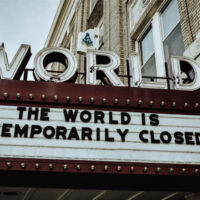

Non-Affirmative Action
I seriously cannot believe I am about to type this sentence, but here it goes. I actually agree with a major policy decision of the Trump administration. Ok, there, I said it. Now please excuse me for a few moments. I think I need to go scour the stink off myself for the next couple of days.
So just what policy am I here to discuss in this week’s TRUTH: In 1000 Words or Less? I am talking about Trump ordering the Justice Department to investigate racial discrimination or preference in the determination of university admissions acceptance. Now before you start railing against me for racial intolerance or reciting the long course of historical social policies that have made affirmative action necessary in order to remedy the ills of the past, let me remind you that I have long championed the cause of minorities in both the classroom and in this very column. I am fully aware of the complex and colored context of our nation’s troubled racial history and the need to address the evils that have perpetually undermined African-Americans and other minority groups and thus put them significantly behind their white counterparts in a life race that was supposed to be equal from the start. I’m just not sure that skewing college admissions practices in their favor is the way to go about it.
For starters, the case that has brought about this recent questioning of the use of affirmative action in college admissions decisions was actually brought by Joe Zhou, a Chinese American who failed to gain admittance into Harvard despite near-perfect ACT and SAT scores, a 4.44 grade-point average, being named class valedictorian, and a resume that included teaching English in China and serving as captain of the varsity tennis team. Shoot, if that doesn’t get you into Harvard, what the hell does? Was Zhou expected to develop the cure for cancer while moonlighting as a 25 point a night scorer for the Los Angeles Lakers? Well, being Asian American sure didn’t help his cause. In fact, a 2009 study found Asian Americans had to score 140 points higher on SAT exams in order to be on equal footing with whites in private university admissions — a difference they sometimes call the “Asian tax.”
At Harvard, which has argued in a Supreme Court brief that not considering race would hurt its “excellence” as a school, the incoming class of freshmen is 22.2% Asian American, 14.6% African American, 11.6% Latino, 2.5% Native American or Pacific Islander, and 49.1% white. By comparison, the U.S. population is 5.7% Asian American, 13.3% African American, 17.8% Latino, 1.3% Native American or Alaska Native, 0.02% Native Hawaiian or Pacific Islander, and 61.3% white, according to the U.S. Census Bureau. When you analyze this data, it is clear that Asian Americans are overrepresented in proportion to their overall representation within the US population demographic. But shouldn’t they be? Clearly, they are already facing tougher odds of getting in than other students, so why should they be punished for their hard work and talents as a collective population?
Equally telling in these numbers is the fact that African-Americans are actually fairly well represented in Harvard’s incoming freshman class, but you know who isn’t? That’s right- whites. In fairness, much of this is probably attributable to Harvard’s long-standing affirmative action policies, a set of policies that was recently upheld by the Supreme Court in Fisher v University of Texas, in which the court ruled against a white woman who felt that her rejected application was at least partially attributable to the university’s use of racially-informed admissions policies. In that case, the court ruled that the university’s desire to create a vibrant learning environment with a diverse student population outweighed the student’s right to protection from racial discrimination. But I’m not sure they made the right decision.
I agree that we need to right the wrongs of our checkered racial past, but the way to right the wrongs of past racial discrimination is not further racial discrimination, especially when it is state-sponsored. Neither governments nor universities should be in the business of making decisions based on the color of someone’s skin. Rather, these should be the institutions that serve as the ivory towers that turn a blind eye to race and ethnicity in order to serve as a model for the rest of us.
In fact, when we get to the point of university admissions, it is already too late to undo the damage racial differentiation and economic disadvantage has created. We don’t need to let weaker applicants into our institutions of higher learning; we need to make minority students stronger applicants in the first place. We need to create better schools in economically impoverished and educationally challenged areas so that the students who are being raised in these households have the same opportunities that their counterparts in wealthy neighborhoods have. We need to develop early education programs and family support groups so that kids are immune from the deleterious impact of their learning environment in troubled neighborhoods. We need to get every kid up to the starting line of life at the same point right from the beginning, not halfway through the race when the winners have really already been decided.
So let’s stop tying rocks to the legs of certain kids just because we know we have done a crappy job preparing others. Let’s stop pushing down some in order to lift others up. Maybe then we can finally address the racial divide that still afflicts our nation’s soul. And I can go back to disagreeing with everything Donald Trump says.
Steven Craig is the author of the best-selling novel WAITING FOR TODAY, as well as numerous published poems, short stories, and dramatic works. Read his blog TRUTH: in 1000 Words or Less every THURSDAY at www.waitingfortoday.com








Actually, it looks as if statistically Latinos are far more under-represented than whites when one factors in the proportion of both groups in the larger population and the differential of their acceptance a Harvard.
But if those white and Asian kids at Harvard are not exposed to their black and latino counterparts and their viewpoints and personal histories, will they go on to help solve all the early education problems and social ills you delineate? And what about the preference to rural applicants, applicants from underrepresented states and around the world? By blind admissions criteria I wonder if you wouldn’t just be transferring the entire Westchester HS or North Shore of Chicago student bodies to Harvard. Is that what we want?
Great comments, Lynn, but aren’t there other opportunities for integrating diversity other than just universities where the stakes are so high for the individuals involved? Isn’t it hard to tell a parent that their kid didn’t get into Harvard solely because they were white and thus became a casualty to the greater cause of diversity?